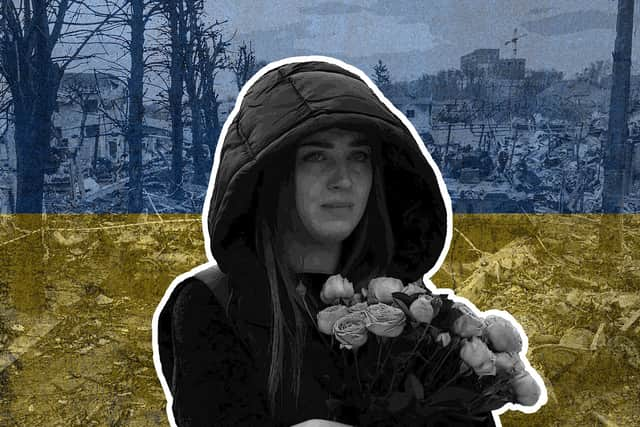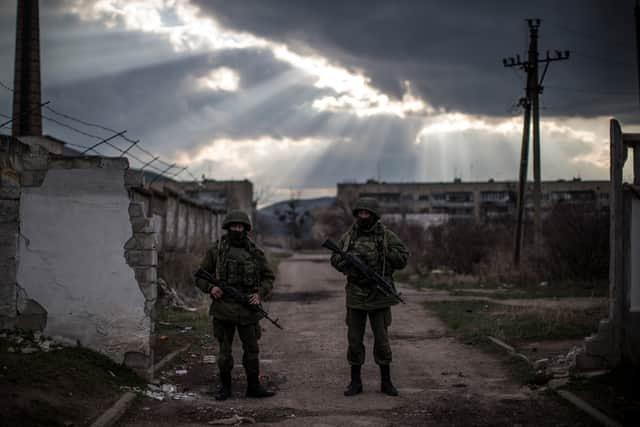When will the war in Ukraine end? Three possible outcomes for Ukraine and Russia explained one year on
and live on Freeview channel 276
When Russia launched a full-scale invasion of Ukraine almost 12 months ago, there was little hope that the country would find itself where it is at the moment.
The Russian military power was thought to vastly outrank that of Ukraine’s, with much more manpower and updated military equipment. At the beginning of the conflict, experts predicted that Russia would overpower its neighbour within a matter of weeks.
Advertisement
Hide AdAdvertisement
Hide AdCut to one year later and the two countries are still battling it out, with Ukraine continuing to put up a defiant battle against Vladimir Putin’s attempted conquest of its land. The fight back from Volodymyr Zelensky’s troops has been hailed on the international stage, with the Ukrainian leader becoming a symbol of resistance.
As the conflict hit regions and cities such as Kyiv, Kherson and Zaporizhzhia, Ukrainian and Russian battled to take or regain ground. As it stands, Russia still remains in Ukrainian soil, and the battle rages on between them.
But is there an end in sight - and what are the possible ways the war could end? NationalWorld spoke to James Rogers, co-founder of Council on Geostrategy, about the situation as it stands.
How could the Ukraine-Russia war end?
Frozen conflict
Rogers explains that despite the ramp-up in conflict and international attention, Ukraine and Russia have indeed been fighting over territorial ground ever since Putin annexed the region of Crimea in 2014. This has become somewhat of a “frozen” conflict, meaning that widespread fighting has calmed down, while there has been no return of territory to Ukraine.
Advertisement
Hide AdAdvertisement
Hide AdHe said: “It’s just sort of whirring away in the background, but it’s not forcing anyone in. Now, that could actually be ultimately what Russia goes for.
“If Russia can’t seize more territory, if Russia can’t remove the government in Kyiv, if Russia can’t prise away the support from the Western powers to Ukraine, then it might simply try and keep hold of the large tracts of the territory that it’s already seized in the Donbas and to the south of Ukraine. Russia could try to freeze the conflict over to buy some time and begin a new push, whether that’s in two years, five years or even 10 years down the line.”
‘Freezing’ the conflict might not mean peace for long though. While Putin, who is in his 70s, will come to the end of his premiership in the future, there will be someone within the Kremlin ready to pick up and carry on Russia’s conquering aims.
“Whatever replaces the Putin regime in Moscow will be very similar and it will have the same logic of expansion that Putin seems to have. A frozen conflict would be also entirely detrimental to Ukraine’s future and its sovereignty as well as its prosperity,” Rogers says.


Ukraine pushes Russia out
Advertisement
Hide AdAdvertisement
Hide AdThe position Ukraine currently finds itself in has surprised the international community and Russia itself. Aid and support coming from the West has helped to bolster defences in the country, and has done a decent job so far at keeping any major Russian advances at bay.
In this respect, a strong and fully-equipped Ukraine could possibly look at pushing Russia out of territory that it has gained ground in since 24 February 2022 and signing a treaty with its neighbouring country. However, there are complications that this could pose.
“Where that leads to is anyone’s guess, because Ukraine would not be in control of Crimea, the land that was initially seized back in 2014,” explains Rogers.
There is a world in which Ukraine pushes out Russia and recaptures the Crimean peninsula in one fell swoop. However, this is possibly the most unlikely outcome of the current situation.


Advertisement
Hide AdAdvertisement
Hide Ad“It’s one thing to take control of those territories to the south and the east that were recently taken by Russia. It’s quite another to take control of Crimea.
“It’s not clear the extent to which Russia or the Putin regime would then push back using weapons that have not yet been used in this conflict, potentially even nuclear weapons against Ukraine in the event that Ukraine was very close to retaking Crimea.”
Russia succeeds in capturing Ukraine
Another way that the current war could come to a close in Ukraine is the grim prospect of a Russian win. While troops have been pushed back so far, there is no doubt that Putin could amp up the military power or possibly use deadlier weapons in the future to reach this aim.
However, succeeding in this way may hinge on the West’s support of Ukraine being removed, which is unlikely, according to Rogers: "I think that’s quite unlikely given what we’ve seen over the last year. If the Western powers, for some reason, relinquish their support for Ukraine or the government in Ukraine changes for any number of reasons, the Russians could make a huge push and gain significant tracts of territory.
Advertisement
Hide AdAdvertisement
Hide Ad“It is an incredibly fluid and dynamic situation and under those circumstances anything is possible which just goes to reconfirm or to compound the point that we cannot allow Russia to win in whatever shape victory looks like to them. That is why it’s so important both for Ukraine and for European security, that we continue to assist the Ukrainians in their fight against the aggressor.”
Comment Guidelines
National World encourages reader discussion on our stories. User feedback, insights and back-and-forth exchanges add a rich layer of context to reporting. Please review our Community Guidelines before commenting.
